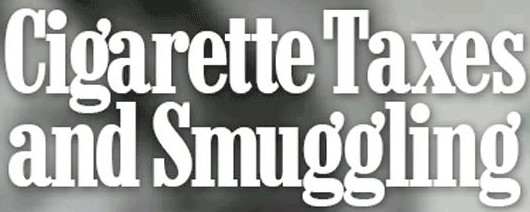

August 16, 20 -
OPINION: Better efforts to tackle tobacco crime would mean more money for schools and healthcare.. MICHAEL O'SHEA
Ireland's budget deficit could rise to 24% of GDP (gross domestic product) in 2010 or about €40bn, following a ruling by Eurostat, the statistics office of the European Commission, on the treatment of public spending on the State nationalised Anglo Irish Bank. (Ireland's budget deficit could rise to 24% of GDP in 2010 following Eurostat ruling by Finfacts Team, Finfacts Ireland, 4/26/2010)
The people will have endure the pain of budget cuts, reduced services and closings to help reduce the deficit. But when Ministers shake their heads and say this is necessary pain, don’t believe them. And when they close down your local primary school, or Garda station; when they charge you more for going to hospital, or take your medical card away, ask them why on earth haven’t they done anything about tobacco smuggling (illicit, illegal, contraband).
By dealing with this scourge [smuggling problem], the Government could wipe hundreds of millions off the toll of cuts they must now make – not just without hurting anyone, but actually doing us some good in the process. The fact is that 6,000 people die each year here from tobacco-related illness, at an annual cost to the taxpayer of about €2 billion.
A few directly related news briefs concerned with tobacco smuggling:[Finance Minister] Brian Lenihan has himself described the crisis as an “epidemic”. And his department admits the exchequer is losing more than €300 million each year from illegal sales – more than a mere drop in the ocean of our deficit. The tobacco industry put that figure at €556 million which, ironically, would almost cover total cutbacks mooted for the health service.
Ireland - tobacco smuggling has reached record levels..;
Ireland retailers claim since display ban smuggling up - denied by health campaigners..;
Ireland - Illicit tobacco trade booms..;
Ireland - no increase in excise duty on tobacco products worry about smuggling..;
Ireland - increase fine for cigarettes imported illegally.. ;
Ireland - modest penalty for cigarette smuggling..;
Ireland - cigarette tax abandoned over smuggling fears..;
But what has the Government response has been underwhelming. Other countries have dealt decisively with smuggling through tough enforcement and sentencing measures, making sure they catch the perpetrators, then putting them behind bars and seizing their assets. We have in effect left the door open so that some of Ireland’s and Europe’s most vicious criminal networks can fill their coffers with near impunity.
Just look at our record. In the three years to March 2010, only nine people were jailed here out of 314 convicted of tobacco smuggling – the longest for a paltry six months. The total fines handed down were €143,674.13, an average of just €457 per person. Compare that to the North, where a fine of £729,000 (€807,000) was imposed in a single case in 2008, or Australia, where a smuggler was fined Aus$11 million (€7.7 million) last year for illegally importing one million cigarettes. (1 US dollar = 0.7808 euro, 1.00 USD = 1.11327 AUS)
What we need is a co-ordinated, national anti-smuggling strategy capable of taking on powerful and well-resourced criminal networks. We all await the World Health Organization's (WHO) solution to the problem of tobacco product smuggling faced by countries throughout the world..
Tax revenue lost through illicit sales in effect sucks funding out of vital services. And international law enforcement agencies agree this trade is helping to fund people trafficking, prostitution rings, arms trafficking and terrorist networks.
There are other effects, too. High smuggling rates have left Ireland’s tobacco control policy in tatters. This is starkly demonstrated in the latest Eurostat figures which put smoking prevalence here at 31 per cent – four percentage points away from a place in the world’s top 10 tobacco-consuming nations. (Ireland - highest tobacco prices in the EU..)
This is scarcely credible given Ireland’s role as a world leader in enforcing important aspects of tobacco control policy, such as our high tobacco tax environment and the workplace smoking ban. The unpalatable truth is that whilst this legislation led to a sharp initial decrease in tobacco consumption, we are now worse off than when we started. Although the lack of investment in smoking cessation is partly to blame, the main driver of demand is the availability of cheap cigarettes.
Further increasing tobacco tax would have the double effect of raising revenue and ensuring a healthier nation. We estimate that a €1 increase in tobacco tax would reduce smoking rates by at least four points from the Eurostat figure and yield an extra €200 million annually to the exchequer.
That can be translated directly into more pain that could be saved. In education, for example, we could avoid primary school closures, any reduction in special needs assistants and any increase in class sizes and still have huge amounts left over.
Reference: State could reap millions if it beat tobacco smuggling, MICHAEL O'SHEA, IrishTimes.com, 8/16/2010.


0 comments:
Post a Comment